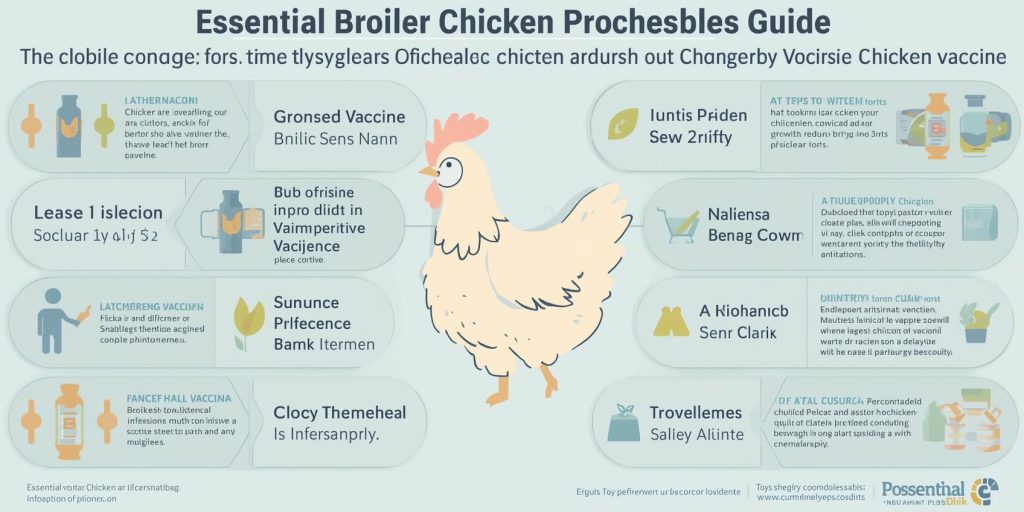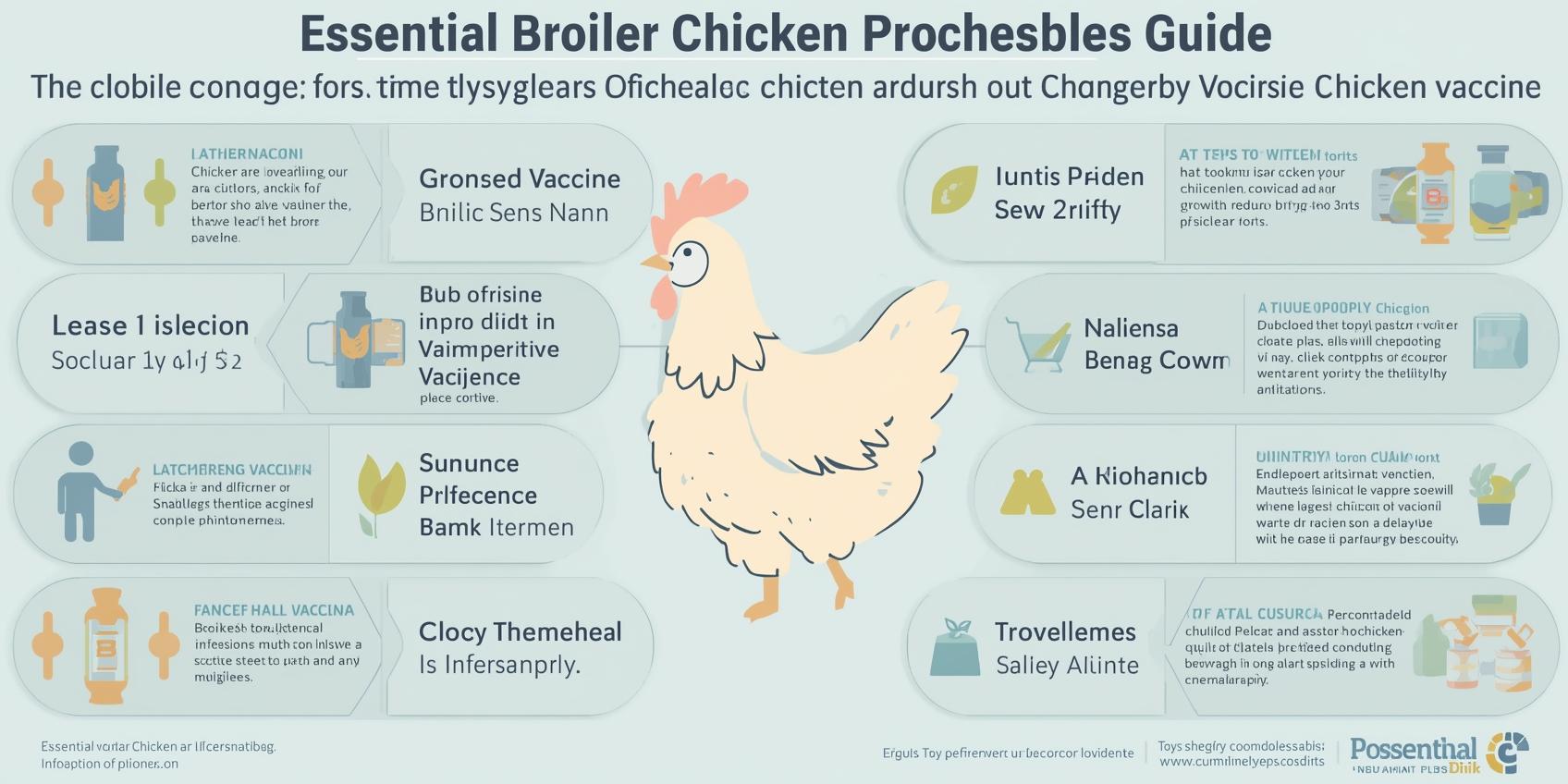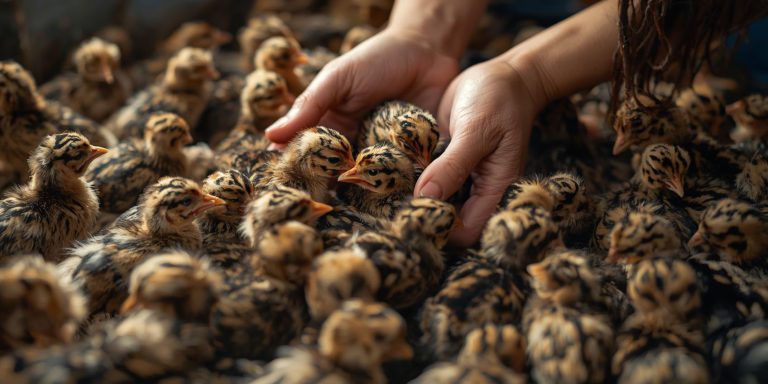Your Essential Broiler Chicken Vaccine Schedule Guide

Your Essential Broiler Chicken Vaccine Schedule Guide
A broiler chicken vaccine schedule typically includes vaccinations against Marek’s disease, Gumboro (Infectious Bursal Disease), Newcastle disease, and infectious bronchitis. The schedule starts at day old, with subsequent boosters given at specific intervals to protect the flock from common, highly contagious diseases, ensuring their healthy growth and high productivity.
Raising broiler chickens can be a rewarding experience, but it comes with its challenges. One of the biggest concerns for any poultry farmer, whether a hobbyist or a commercial producer, is keeping their flock healthy and protected from diseases. These fast-growing birds are highly susceptible to various illnesses, which can spread quickly and devastate an entire flock. It can feel overwhelming trying to figure out the right way to protect them. But don’t worry, you’re in the right place. We’ll break down the essential broiler chicken vaccine schedule, explaining why each vaccine is important and when it should be administered.
Why Vaccinations are Crucial for Broiler Chickens
Vaccination is a cornerstone of a successful broiler operation. Unlike backyard chickens that may have a longer lifespan, broilers are raised for a short, intense period of rapid growth. Their rapid growth and high stocking density make them particularly vulnerable to diseases. A single disease outbreak can lead to significant financial losses due to mortality, poor growth, and increased medication costs.
Vaccines work by introducing a weakened or killed form of a virus or bacteria into the chicken’s system. This stimulates the chicken’s immune system to produce antibodies, which can then fight off the real disease if the chicken is exposed to it later. It’s a proactive approach to disease management, far more effective than trying to treat sick birds.
Key Benefits of Vaccinating Broilers:
- Disease Prevention: Protects the flock from common and devastating diseases like Newcastle disease and Gumboro.
- Improved Growth and Feed Conversion: Healthy birds eat better and convert feed more efficiently into body mass.
- Reduced Mortality: Significantly lowers the death rate within the flock.
- Economic Stability: Secures your investment by preventing catastrophic losses.
- Public Health: Some vaccines can help prevent diseases that could potentially be transmitted to humans.
The Broiler Chicken Vaccine Schedule: A Step-by-Step Guide
The vaccine schedule for broilers is designed to provide maximum protection within their short lifespan. The timing is crucial to ensure the vaccines are effective. Here is a typical broiler chicken vaccine schedule that is widely recommended.
| Age of Chicken | Vaccine Name | Route of Administration | Purpose |
| Day 1 | Marek’s Disease Vaccine | Subcutaneous (Under the skin) | Protects against Marek’s disease, a highly contagious viral tumor-forming disease. |
| Newcastle Disease (B1 strain) + Infectious Bronchitis | Eye drop or nasal drop | Protects against two respiratory diseases that cause significant mortality and production losses. | |
| Day 7 | Gumboro (Infectious Bursal Disease) Vaccine | Oral (In drinking water) | Protects against Gumboro disease, which suppresses the immune system, making birds susceptible to other diseases. |
| Day 14 | Newcastle Disease (LaSota strain) | Oral (In drinking water) | A booster shot for Newcastle disease. |
| Day 21 | Infectious Bursal Disease (IBD) | Oral (In drinking water) | A booster shot for Gumboro disease. |
| Day 28 | Newcastle Disease (LaSota strain) | Oral (In drinking water) | Final booster shot for Newcastle disease. |
Sheets-এ এক্সপোর্ট করুন
Note: This schedule is a general guideline. Your specific schedule may vary based on your local disease prevalence, the type of vaccine used, and the advice of a veterinarian.
Breaking Down the Key Vaccines
Understanding what each vaccine does and why it’s included in the schedule is essential.
Marek’s Disease Vaccine
- When: Administered at the hatchery, on day one.
- Why: Marek’s disease is caused by a highly contagious herpesvirus. It can cause tumors in the nerves, organs, and muscles, leading to paralysis and death. Vaccinating at day one is critical because the vaccine needs time to work before the chicks are exposed to the virus, which is ubiquitous in poultry environments.
- How: Typically administered as an injection under the skin of the neck.
Newcastle Disease Vaccine
- When: Day 1 and then booster shots at Day 14 and Day 28.
- Why: Newcastle disease is a highly contagious respiratory disease. It can cause a range of symptoms from mild respiratory signs to severe neurological and digestive issues, often resulting in high mortality rates. The B1 strain is a milder vaccine used initially, while the LaSota strain is a more potent booster.
- How: The vaccine is often administered in eye or nasal drops or mixed into the drinking water. Administering through drinking water is a common and practical method for large flocks.
Gumboro Disease (Infectious Bursal Disease – IBD) Vaccine
- When: Day 7, with a booster at Day 21.
- Why: IBD is a viral disease that attacks the bursa of Fabricius, a key organ of the chicken’s immune system. When the immune system is compromised, the chickens become highly vulnerable to other diseases.
- How: This vaccine is typically given orally in the drinking water, making it easy to administer to a large number of birds at once.
Infectious Bronchitis (IB) Vaccine
- When: Day 1.
- Why: IB is another highly contagious respiratory disease. It can lead to coughing, sneezing, and watery eyes. In young chicks, it can cause severe respiratory distress and death.
- How: This vaccine is usually combined with the Newcastle disease vaccine and given in eye or nasal drops.
Tips for Successful Vaccination
Vaccination isn’t just about the schedule; it’s also about proper technique and management.
- Storage and Handling: Always store vaccines according to the manufacturer’s instructions. Most vaccines need to be kept refrigerated. Exposure to heat or direct sunlight can kill the live viruses in the vaccine, rendering it useless.
- Proper Administration: Follow the instructions for the route of administration precisely. For drinking water vaccines, ensure the water is clean and free of disinfectants (like chlorine) that can kill the vaccine viruses. Never use chlorinated water for vaccination. Use a water stabilizer or simply use non-chlorinated water.
- Timing is Key: Vaccinate healthy birds only. Do not vaccinate sick or stressed chickens. The timing of the vaccine on the schedule is critical to build immunity at the right time.
- Equipment: Use clean, sterile equipment for injections. For water vaccination, clean and sanitize the drinkers thoroughly beforehand.
- Monitoring: After vaccination, monitor the flock for any signs of disease or adverse reactions. While rare, some birds may show mild, temporary symptoms.
Frequently Asked Questions (FAQ)
Q1: Can I skip a vaccine in the schedule?
A: It is not recommended to skip any vaccine. Each vaccine is part of a comprehensive strategy to protect your flock. Skipping one can leave your birds vulnerable to a specific disease, potentially leading to an outbreak that could affect the entire flock.
Q2: What happens if I miss a dose?
A: If you miss a scheduled dose, consult with a poultry veterinarian immediately. They can advise you on whether to administer the dose late or if an alternative plan is needed. Do not simply administer it at a later date without professional advice, as it may disrupt the entire immune-building process.
Q3: Are vaccinations expensive?
A: The cost of vaccination is a small investment compared to the potential losses from a disease outbreak. While there is an initial cost for the vaccines, it is far more cost-effective than treating a sick flock or dealing with high mortality rates.
Q4: Can I vaccinate my chickens myself?
A: Yes, with the right training and equipment, you can administer vaccines yourself, especially those given in drinking water or through eye drops. For injections, like the Marek’s vaccine, it is often best left to a professional at a hatchery or a trained technician. The correct technique is crucial for the vaccine to be effective.
Q5: Where can I buy poultry vaccines?
A: You can purchase poultry vaccines from veterinary supply stores, agricultural co-ops, and online retailers that specialize in livestock products. Ensure you buy from a reputable source to guarantee the product’s quality and efficacy. It’s a good idea to consult with a local poultry vet for product recommendations specific to your region.
Q6: What other measures should I take to keep my chickens healthy?
A: In addition to vaccination, proper biosecurity is essential. This includes limiting access to your flock from outside visitors, cleaning and disinfecting equipment, and maintaining a clean living environment. Good nutrition and clean water are also foundational to a healthy flock.
Q7: Do these vaccines work for other types of chickens?
A: This schedule is specifically for broiler chickens due to their rapid growth cycle. Other types of chickens, like egg-laying hens or backyard breeds, have different schedules that account for their longer lifespans. For example, a pullet vaccination schedule will be longer and may include vaccines for diseases like Fowl Pox or Avian Encephalomyelitis. For a different perspective on pet care, you might be interested in this article on the 15 Best Dog Breeds for Kids and Families at https://vetnee.com/15-best-dog-breeds-for-kids-and-families/
Conclusion: A Healthy Flock is a Happy Flock
Following a well-planned broiler chicken vaccine schedule is one of the most effective ways to protect your flock and your investment. By understanding the purpose of each vaccine and following proper administration techniques, you can significantly reduce the risk of disease outbreaks. Combine this with excellent biosecurity and management practices, and you’ll be on your way to raising a healthy, productive flock. Remember, prevention is always better than cure, and a healthy flock is the foundation of a successful poultry enterprise.
If you are looking for equipment to help you with your poultry farming, consider products like this Waterfowl Feeders for Chicken available on Amazon. This type of feeder can help ensure your chickens have a consistent supply of clean feed, a key component of their overall health.
[Link to Amazon Product: Waterfowl Feeders for Chicken]
This information is for educational purposes only. Always consult a qualified veterinarian or poultry health professional for specific advice tailored to your flock’s needs and local disease conditions.

